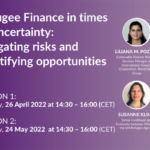Tags Artificial Intelligence Cryptocurrency Cybersecurity Digital Banking Events Payments Regulation
Stay up-to-date on all the all the latest FinTech news and information from around the world in the BFC FinTech Monitor.
Around the World
- G20 participants are working with specialists from international institutions to develop a roadmap for regulating national cryptocurrencies. Work toward this aim is scheduled to be completed by the end of 2022.
- Revolut, a British FinTech startup with Russian and Ukrainian roots, is preparing to apply for a banking license in the United States and is also planning to develop new cryptoproducts in collaboration with Fireblocks.
- In a recent McKinsey report, traditional financial institutions are put on notice to either adopt artificial intelligence (AI) solutions or be overtaken by neobanks and tech giants. Specifically, the report mentions that traditional financial institutions need to use AI to rethink consumer interactions, create their own ecosystems, analyze consumer needs and create personalized offerings that go beyond banking.
- The new FinTech unicorn Razorpay, a company focused on servicing and lending to small- and medium-sized businesses, has entered the Indian payments market.
- PricewaterhouseCoopers (PwC) is predicting that the economic effect of blockchain implementation in 10 years will reach USD 1.7 trillion, with China, Japan and India benefitting the most. The main areas of blockchain application over the next 10 years will likely be supply chain tracking, payments and financial services, government, education and healthcare.
- According to Bloomberg, Google is planning to implement functionality on the YouTube platform that will allow it to transform into a full-fledged marketplace where users can buy goods from videos in one simple click. YouTube has confirmed that it is already testing this on a limited number of channels.
- Analysts of the Moody’s rating agency have stated that financial institutions may start to raise interest rates on deposit accounts in order to compete with online payment services and e-wallets. Alternatively, some may be consolidated to lower margins and increase investments in technology.
Russia
- According to Dmitry Kolesnikov (director for development of innovative services of the National Payment Card System), the transfer of funds between legal entities within the framework of the Fast Payment System of the Central Bank of Russia will become available starting next year.
- New legislation that will expand the usage of biometric solutions is expected to be adopted by the end of 2020, resulting in financial institutions being able to commercialize face-to-face payments in shops and cafes.
- The Central Bank of the Russia is creating FinTech Hub, an educational platform for training specialists in FinTech and cybersecurity. It will operate on the basis of the Sirius University of Science and Technology and is expected to open in January 2021.
- FinFech Association experts have analyzed foreign experiences in using blockchain in insurance and have prepared recommendations for the Russian market. In particular, they noted that this technology will allow for the launch of new types of products as well as improve the quality of services already offered.
- Specialists from SberIndex and the OFD Platform have determined that fear of contracting COVID-19 from banknotes has accelerated the spread of cashless payments in Russia.
Ukraine
- Monobank could become a unicorn by 2022, especially as it has plans to increase its number of clients to 5 million over the next two years.
- The Ministry of Digital Transformation has announced a collaboration with Samsung toward digitalization and the development of digital technologies, the economy, innovations and the digital skills of the population.
Belarus:
- Priorbank and Visa have launched a range of services for transferring businesses online. The services, aimed at individual entrepreneurs and legal entities, include a website builder, an integrated CRM system and reduced online acquiring fees for new clients.
- BPS-Sberbank has begun testing the “paperless office” working format. The format uses digital documents that can be signed on a tablet. At the moment, these documents are printed out, with the plan to eventually phase this out.
- Minsk High Technologies Park has registered 83 new residents, representing the FinTech, logistics, e-commerce, games industry, medicine, audit, consulting and education spheres.
Kazakhstan:
- Kaspi.kz, one of the largest FinTech companies in Kazakhstan, has been listed on London Stock Exchange (LSE) and has already managed to attract approximately USD 1 billion in investments.
- Kazakhstani authorities are planning to launch a new digital service – a ocial wallet for receiving payments from the state. According to Kapital.kz, it will work as a mobile application and allow users see balances, conduct monetary transactions, open bank accounts, transfer money, replenish cards and purchase goods and services via QR codes.
- Data from the finprom.kz portal shows that over 80% of non-cash card payments in Kazakhstan are made on the internet or via telephone.
- Kapital.kz has published materials on how financial pyramids are increasingly being created in instant messengers and social networks as well as ways to protect yourself.
Kyrgyzstan:
- According to the National Bank of Kyrgyzstan, Kyrgyz banks resumed their work, although international payment systems are still not available in the country.
- Citizens of Kyrgyzstan can now submit biometric data at any collection point, regardless of registration or actual residence.
Uzbekistan:
- Apelsin, a digital branch of Kapitalbank, is introducing contactless payments in HUMOPay. The service will only be available on Android devices as Apple has close access to third-party developers.
Azerbaijan:
- Residents of Azerbaijan received fake emails and messenger messages on behalf of the local Association of Banks. The messages alleged that recipients had been victims of a cyberattack and that their accounts had been temporarily closed.
 BFC Bulletins Monthly News Digest
BFC Bulletins Monthly News Digest




